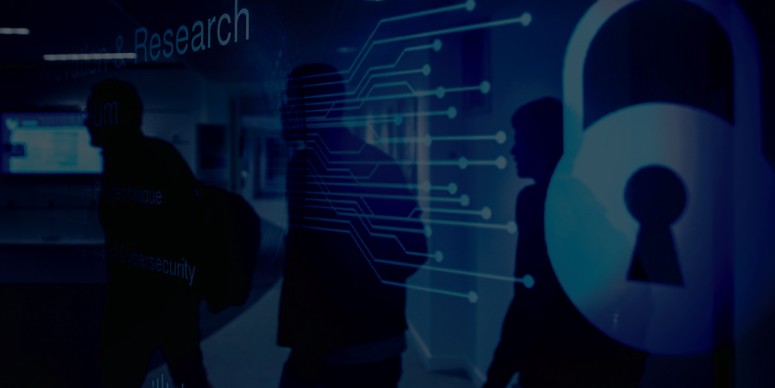Remote working must go hand in hand with remote cybersecurity. The rushed transition to a remote workforce brought along a demand for new digital services. And protecting the company and safeguarding its data security is definitely one of the important challenges of the era where working remotely becomes business as usual. Due to the current global health situation, many companies have been forced to pivot to a
remote work setting. Working in unfamiliar and unprecedented circumstances can cause unforeseen issues, especially when it comes to the
security of your data.
While employees are working from home, companies lose more control over the security of their information compared to when everyone worked under the same roof. Because your employees are more spread out and IT departments have longer response times,
there is more room for error.
Mimecast published a study that shows over 50% of its respondents don’t believe their employer stresses the importance of good remote cybersecurity practices.
As you can observe in the image below, the World Economic Forum’s COVID-19 Risks Outlook found "
50% of enterprises were concerned about increased cyberattacks due to a shift in work patterns alone."So, if still in doubt about what to think of remote cybersecurity, here are some reasons why
it is crucial for any business, and some tools that can help you achieve better network security.Data breaches and hackers gaining unauthorized access to information are costing companies millions of dollars each year. Although many companies are investing in cybersecurity, they aren’t investing their money in the right areas. Most business owners
spend their money reactively, as opposed to proactively. In terms of all the money that is spent on cybersecurity, on average, “
82% of attack costs go toward detection, containment, recovery, and remediation.” The average cost of a phishing attempt would cost a company $832,500;
acting to prevent these cyberattacks from happening in the first place
would greatly reduce the amount of money spent on cybersecurity.
Make sure that you are being proactive in your approach to remote cybersecurity. Already being in unfamiliar environments can put you on the back foot, so actively looking ahead and preventing further complications is crucial. One way to do this is to
develop a cybersecurity protocol for your employees while out of the office. This can cover basic things such as only working from company-approved devices to more company-specific priorities such as requirements for password lengths and complexity.Data leaks and the misuse of company devices can be devastating for a company. It’s important to educate your employees on
the importance of proper remote cybersecurity practices in order to ensure that everyone is on the same page.
Many employees have shown to prioritize the ability to have a connection to the internet over the security of said connection. In fact,
77% of traveling employees connected to unsecured networks, and 63% of that 77% accessed work data while doing so.
Unsecure networks are among the most vulnerable to remote cybersecurity threats, as they are the most populated and least secure networks. For your remote employees, having access to a Software-Defined Wide-Area Network, or SD-WAN solution, allows them to have the best of both. They are able to have a high-speed connection while simultaneously securing all company and personal information.
Providing your employees with the ability to secure their data, whether company-related or personal, shows an invested interest in their wellbeing. While it’s the companies job to provide for the organization’s overall cybersecurity needs,
the onus then falls on the employees to abide by the regulations. Making sure that all cybersecurity policies are transparent and relatable can help ensure that the employees understand what measures are being taken, and why. Trusting employees with a view of the decision-making process can help them feel more a part of your company.Many companies have had to
relax their electronic device policy, given the
unpredicted circumstances of forced remote work. This means that in many places, employees are allowed to use their personal devices for company-related purposes, which brings along a whole host of risks. Personal devices are often unsuited for company work for several reasons:
- Many devices have either no anti-virus programs, or they are very out of date
- Personal passwords often don’t meet the recommended criteria and are easily hacked
- People often improperly clear data when disposing of or giving away their devices
If your company is allowing individuals to work from personal devices, make sure that they
have security measures in place to protect any sensitive data. Make sure that they have the latest anti-virus software in place, and stress the importance of not working with confidential information when in front of people that they might be living with.
On top of some of these things, providing them with a
Virtual Private Network (VPN) is a relatively simple and effective way to secure information. Although not as powerful as some other methods, it’s easy to use in a pinch and works at a high enough level.Despite the abrupt transition to a unique work lifestyle, it’s important to ensure that
cybersecurity is still at the forefront of a company's prioritization. Investing in proactive remote cybersecurity methods can wind up saving your company a great deal of money, and emphasizing the importance of general cybersecurity safety can help
build that two-way street of trust between your employees and your company that is needed for these methods to work. Although employees might be limited in their selection of devices to work from, make sure that there are some cybersecurity ground rules in place, for the sake of both the employee and company.
Cybersecurity is more important than ever currently, as the “
number of has gone up 600% worldwide since the COVID-19 pandemic started.” Ensuring that your company has the proper remote cybersecurity tools can help reduce any impact and keep your data safe.
Digital-led business is a well-led business! Get on board with Digital Tranformation!
